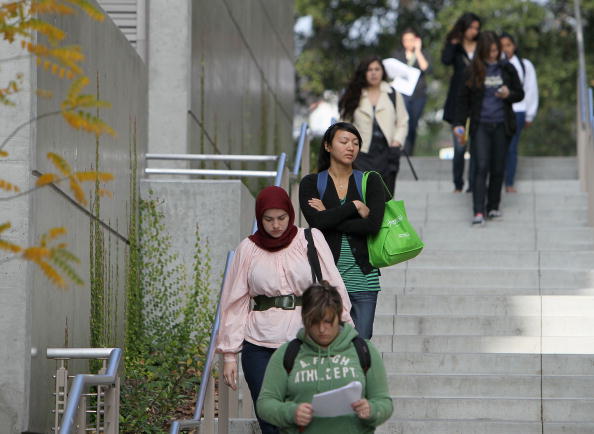
It wasn’t easy for David Arceo to let his firstborn, Lizandra, leave home to attend UC Santa Cruz. His wife, Blanca, graduated from Fresno State and teaches first grade, but David attended school only through eighth grade because of illness. “I worry about it,” he said as his 17-year-old prepared to move away from home in Merced to attend the fall quarter. Still, he added, “I think if other kids did it, she can do it.”
A major reason he’s fine with the idea of college is the Parent Empowerment Program (PEP) run by the UC Merced Center for Educational Partnerships.
The 10-year-old center targets valley students, many of whom might not otherwise see college as a goal, and prepares them and their parents for higher education. “Our clear commitment is to fundamentally change the opportunity to learn,” said Jorge Aguilar, the UC Merced associate vice chancellor for educational and community partnerships.
Arceo and his wife attended PEP workshops that demystified all aspects of getting into and attending college: what courses and exams high-school students have to take in order to be admitted, how to fill out financial forms, what college courses to sign up for.
“It educates parents about college life for their children,” said Patrick Durr. “It takes away the fear of what college life will be like.” The social science teacher at Modesto High School coordinated the empowerment program that began there last year and will be held again in the spring. Presentations were given in English and Spanish, with the Spanish-speaking parents the most consistent participants, he said. An average of 40-45 parents attended each session and 36 earned a certificate of completion. Because the two-hour workshops were held in the evening, parents sacrificed to attend, Durr said. “It testifies to how important it is to them.”
English is not the first language for more than 67 percent of parents in the program, according to statistics on the center’s web site. The existence of such language and cultural barriers can make higher education seem an intimidating and unreachable goal. “Sometimes a kid is qualified but the parent says, ‘No, I’ve heard crazy things,’ “ Durr said.
PEP targets just that mom and dad, “unwilling parents of willing students,” vice chancellor Aguilar said with a laugh.
That could describe David Arceo, who said, “If it was me, I want her to stay here.”
Going to college “was a decision she made,” he said of Lizandra, who is interested in studying law. He said he told his daughter “it’s good you be a lawyer. You fight all the time.”
This is followed by his pointing out that Lizandra went to preschool at the tender age of 2 years, 7 months. She’s still his baby.
Spending time on a college campus made him more comfortable with the idea of her going away to college. A perk for parents who attend a majority of the eight PEP sessions is a bus trip to a guided tour of a college campus. It might include stops at a police station and a dorm cafeteria. The idea is to address parents’ concerns about safety as well as provide a feel for their student’s everyday life.
Over the years, Arceo has toured the campuses of CSUs Fresno, Sacramento and Monterey Bay, and UC Davis. “I liked them all,” he said, despite his opinion of UC Davis as being “too big, too many bikes. I’ve never seen so many bikes at a university.”
Lizandra has been involved since middle school in the Center for Educational Partnership’s initial program — UC Scholar EAOP (Early Academic Opportunity Program). It aims to get youngsters thinking about college early and, as they move to high school, get them into courses that will qualify them for higher education.
The group workshops in middle school turn into several annual one-on-one sessions with an advisor as the young scholars go through high school. That’s a good thing, Lizandra said, because “some kids didn’t feel good talking about their grades” in front of other students. The advisors “never say they’re too busy, no,” she said. “They always listen.” Center staff help high-school seniors apply for college and learn to write personal statements, according to Aguilar.
Lizandra attended a weekslong workshop that taught how to write effective college applications. She said her UC Scholars advisors provided “extra hope and a source I can go to.” Without the program, Lizandra said she would “kind of be lost in the application process. I probably wouldn’t be ready.”
“If parents go to the program it makes it easier for parents and the kids,” she added, explaining that in her mother’s college days, applications went snail mail while everything now is computerized. Lizandra said she takes comfort in the PEP sessions illustrating to her parents that even though computers will make some of her college chores faster and easier, “I’m still working hard.”
UC Scholars was the center’s first program. “It taught us that it was extremely difficult to work only with students and not other stakeholders,” said Aguilar. A cornerstone of the center now is its liaisons with families and school districts in a far-flung area that ranges from Bakersfield to Modesto, Avenal to Strathmore. Other programs at the center include one that compiles data on student enrollment and success, and another that looks for talented low-income students to help them become among the first generation in their family to attend college.
The center has brought in $15 million in grants over its 10-year history, Aguilar said, and served 10,000-plus people with that money. An additional 14,000 “benefit from our presence,” he said.
“College attendance is abysmally low in the valley,” Aguilar pointed out. So, while the center is part of UC Merced and started with a program called UC Scholars, the center wants to serve area students’ “overall college needs no matter where they go,” he stressed. “Many of our students enroll at CSU.”





